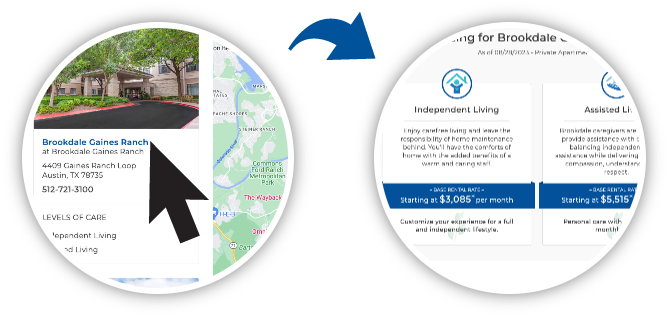- Home
- Healthcare Professional Referrals
- Blogs
- How Senior Living Communities Can Improve Behavioral Health
Depression and Anxiety Are Leading Disorders
A variety of environmental, social, biological and psychological factors can underlie behavioral health disorders, which affect an estimated 15%–25% of older adults. One individual’s condition might be hereditary. Perhaps the brain chemistry of another is unbalanced, hormonal fluctuations can increase one’s susceptibility to mental health conditions. For yet another, a traumatic event can be at the root of the issue.
Among seniors, depression and anxiety are leading disorders. These often stem from transitions commonly associated with aging: loss of a person’s loved ones, abilities and independence, for example, or a move into a new and unfamiliar environment. Feelings of loneliness are closely related to depression and anxiety, which can lead to suicidal ideation.
The recent pandemic did not help matters. America’s suicide rate reached an all-time high in 2022, with nearly 50,000 individuals taking their own lives, and the largest increase came among adults 65 and older.
Erasing the Stigma and Recognizing the Signs
Lack of education and awareness is often the cause for the social stigma that continues to exist to varying degrees around mental health issues, even in the 21st century. Fortunately, as a society we have become more comfortable discussing the topic in recent years. The pandemic shined a light on the toll that isolation and loneliness can take on mental health, especially among seniors. While both anxiety and depression can be hereditary, they are often situational, triggered by a traumatic event such as a car accident or the death of a loved one. That differentiates them from conditions such as schizophrenia or bipolar disorder, which tend to be diagnosed in early adulthood.
When a senior becomes depressed, those closest to that individual are often quick to attribute their loved one’s behavior to either dementia or normal signs of aging. In reality, the root of the cognitive decline may be depression or anxiety, not dementia. Recognizing and acknowledging this correlation is key to addressing the cause of the symptoms.
Awareness can help caregivers and family be attentive to changes in mood and behavior. Red flags include a decline in activities of daily living (ADLs), particularly those related to personal care, hygiene and grooming. A person might lose interest in eating, showering or getting out of bed. In extreme cases, a sudden or ongoing change in personality might also be a sign of possible suicidal ideation. For example, early warning signs of suicidal ideation include frequent talk about death, dying or wanting to die, especially after a new diagnosis or the emergence of new conditions.
A Holistic, Multidisciplinary Approach Is the Best Strategy
Aging can complicate treatment for anxiety and depression because older adults often develop comorbid conditions such as diabetes and diseases of the heart, kidneys or liver. The interactions of the medications used to treat these physical issues can interfere with one another, making it more difficult to address the mental health challenges. addressing A coordinated holistic approach is the best strategy for addressing the full range of health issues affecting one’s quality of life.
Mental health disorders, whether hereditary or influenced by situational factors, can often be effectively managed with a combination of approaches and can be helped by engaging in standard healthy behaviors: eating right, physical activity, medication compliance and socialization.
· Eating right. As people age, their diets often change, whether by necessity, preference or both. They may lose their fondness for a dish; a physical condition like diabetes may force them to cut down on or eliminate certain foods. It’s still possible to design a healthy meal plan that meets their dietary requirements and tastes.
· Physical exercise. Even as abilities decline, cardio/aerobic, muscle- and bone-strengthening, balance, and flexibility activity can help seniors improve or maintain their physical health within their limitations.
· Medication compliance. All too often, someone with mental illness, especially depression, will stay on their medication regimen until they start feeling better. Then they’ll decide they don’t need it anymore and stop taking it — only to experience an exacerbation of their condition. That can turn into a vicious cycle that makes stabilization increasingly difficult. Medication compliance is essential.
· Socialization: Social interaction is an important piece of the puzzle. Feeling like part of a community can give a person a sense of purpose and ward off loneliness and depression. Recognition of a resident’s faith traditions also can work hand in hand with medication, treatment, therapy and other psychological support to create a better outcome.
A skilled and attentive senior living care team knows the resident’s conditions and helps to ensure that they get the right support, from inside or outside the community, when they need it. Multidisciplinary care helps ensure that residents benefit from a professional in multiple disciplines such as social workers, therapists or psychiatrists. Some long-term care communities facilitate on-site support, or ready access to support, from providers such as psychiatrists and psychologists.
How Brookdale Communities Support the Whole Journey
Brookdale communities are designed to support residents’ mental and emotional wellness journey, not just the physical one. This gives providers confidence that their patients are receiving the care they need to help stay healthier longer.
Our approach begins with an assessment at move-in to develop a holistic, personalized service plan to establish health goals, reflect personal wishes, and to help keep residents physically, mentally and emotionally well. We review any historical mental health concerns the incoming resident might have, along with what medications they are taking (and why). Our pharmacy support and medication management help verify that they receive the appropriate medication, with a focus on curbing overuse, especially of antipsychotics and anxiolytics.
· Our B-Fit exercise program offers eight class options, allowing each resident to choose to strengthen their physical health in a fun and stimulating social environment that helps meet their preferences.
· We encourage engagement through a variety of social activities. Pairing up residents who share interests helps provide a sense of community that fosters emotional well-being. At Brookdale, we want to know: How can we help you adjust to life in this new environment?
· Family involvement is an invaluable aspect of the Brookdale approach. Family members can get involved through special family nights, support groups, educational resources and possibly a role in the care planning process.
· Our collaborative care approach includes access to supportive services a resident may need outside the community. Open communication and education help us reduce the stigma around mental health and detect early warning signs. Trained staff enhance our ability to help accomplish these goals.
· Brookdale buttresses its support with technology. Telehealth is a valuable tool for connecting residents with their providers. Our clinical and care teams use the PointClickCare electronic health record (EHR), the gold standard for senior living communities.
Our comprehensive approach helps give providers confidence that their patients are receiving the care they need to stay healthier longer. The older we get, the more we realize that being alive and human is a condition with itself. To be alive is to be challenged. At Brookdale, we excel at meeting residents where they are, helping them manage their conditions, meet their challenges and live as full a life as possible.
Camille Jordan RN, BSN, MSN, APRN, FNP-C, CDP is the Senior VP of Clinical Services for Brookdale Senior Living based in Brentwood, TN since September 2022. Camille has held various roles within Senior Care including DON, Clinical Consultant, Chief Nurse Executive, and VP of Clinical Operations. Camille holds a Master’s Degree in Nursing Leadership and Management from Walden University and a Post Mater’s Certificate in Family Nurse Practitioner from Western Kentucky University. Camille has more than 28 years of nursing experience in acute care, psychiatric and mental health care, clinical education, long-term care director of nursing, regional nurse consultant, State of Kentucky Office of Inspector General Nurse Consultant/Inspector, and Advanced Registered Family Nurse Practitioner. Camille is board-certified by the American Academy of Nurse Practitioners in Family Medicine and a Certified Dementia Care Practitioner from the NCCDP. In June 2019 Camille was named to Louisville Business First’s “20 People to Know in Aging Care.” In 2020, at the height of the pandemic, Camille served on the President’s Coronavirus Commission for Safety and Quality in Nursing Homes.
Categories
- Alzheimer's & Dementia
- Caregiver's Corner
- COVID-19
- Health, Safety and Wellness
- Financial Well-Being
- Passion & Purpose
- The Journey to Senior Living
- Trending Now
- Socialization & Relationships
- Brookdale Solutions
- Brookdale Vision and Growth
Archives
View All
- November 2025
- October 2025
- September 2025
- August 2025
- July 2025
- June 2025
- May 2025
- April 2025
- March 2025
- February 2025
- January 2025
- December 2024
X
Let us help find the right community for you!
Complete the form and a Senior Living Advisor will be in touch!


